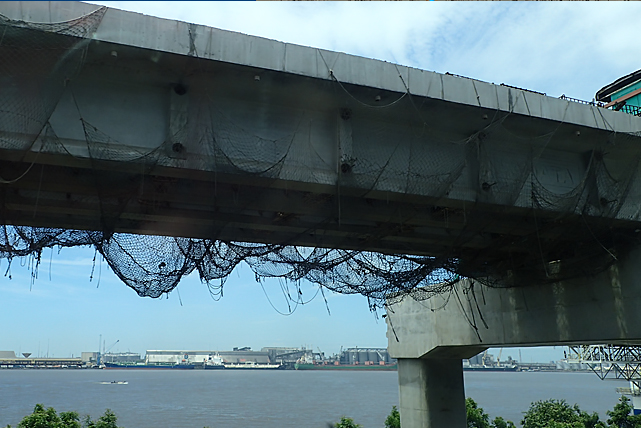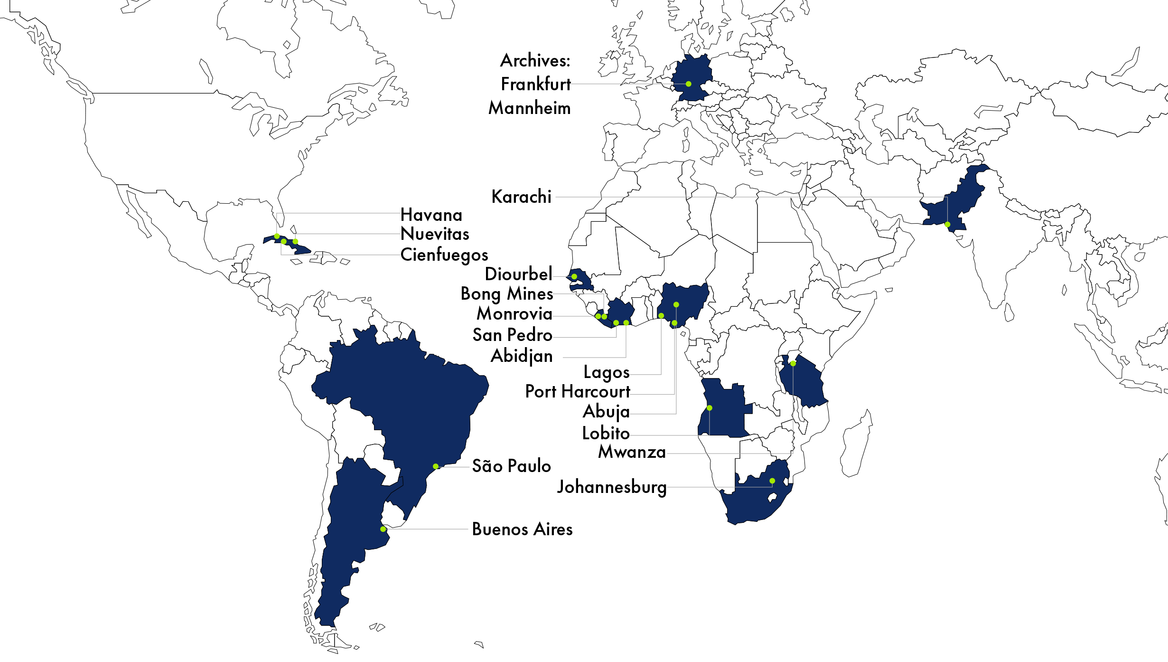Conquering (with) Concrete. German Construction Companies as Global Players in Local Contexts.
Research department: Contemporary History and Archive
Project Leader within IRS: Dr. Monika Motylińska
Project Team: Paul Sprute Maria Jeldes
Funding Organization: Volkswagen Stiftung: Freigeist-Fellowship
Duration: 01/2020 - 02/2026
Global construction companies impact our futures. Yet, the role of these global players and their persistent presence in different regions has barely been reflected upon. This project uses German construction companies as a prism to address a wide spectrum of economic, political, environmental or cultural impacts in specific local contexts throughout the long 20th century and aims to critically analyse success stories and moments of failure. This choice is triggered by the label ‘Made in Germany’, which was established in the late colonial period and remains an unquestioned marker of quality. Focusing on production cycles, the research team scrutinises global flows of capital, labour, know-how and construction materials, primarily in West and Southern Africa as well as Latin America.
Beyond the edifices and infrastructures they construct, global construction companies also fundamentally influence governmental development aid policies, or dislocate people to build a new dam, for example. Yet the role of these major global players and their persistent presence in different world regions has barely been reflected upon.
Our project investigates how major German construction companies conquered markets and spaces, thereby cementing their presence in different regions of the Global South, and it traces the footprints left behind, long after the dust of the construction sites settled. It draws on the observation that it is impossible to fully understand the complexity of the built environment in these regions without acknowledging and analysing the role of construction companies such as Philipp Holzmann or Grün&Bilfinger as actors, stakeholders, transnational legal entities and major driving forces in the processes of globalised construction business. However, in previous bodies of research this perspective has been overlooked, except for rare exemptions.
The research frees itself from narrow disciplinary boundaries, and instead explores construction companies at the intersection between architectural and planning history, urban studies, economic geography, history of technology, construction history and anthropology. Focusing on production cycles, a research team of the PI and three doctoral researchers, each with a different disciplinary profile, and a student assistant have scrutinised global flows of capital, labour, know-how and construction materials such as concrete in the “Global South”. The investigation has run along three main lines of inquiry, each linked to necessary expertise from particular disciplinary fields: (1) it started by looking at the production of concrete as the most widely used building material of the 20th century and a conditio sine qua non for the majority of construction activities. Complimenting the existing research, it follows both the material side of cement production and the extraction of raw materials as well as capital flows and multi-layered interactions between various actors and institutions (economic geography/urban history/construction history). (2) Then, it moves on to the analysis of other types of infrastructural and architectural investments with the goal of unveiling the enduring phenomenon of the label ‘Made in Germany’ from past to present (architectural history/economic history). (3) In the final stage, it focuses on the analysis of the tangible and intangible legacies of the German entrepreneurial presence in selected regions of Latin America and Africa (anthropology/heritage studies). In doing so, this project presents a major contribution towards a genealogy of globalised architectural production and the myriad of foreign and local actors involved.
We consider construction companies a prism enabling a fully new perspective on the complexity of transnational and global ties and their impact on particular local settings. The project does not establish simple causalities, but rather, presents a complicated mosaic of motivations; projected, vocalised and exerted desires; social and material resistance and manipulations and failures, with a particular attention for the dimension of the brut de décoffrage – the rough and the unfinished.
Selected Research Questions
How did the German construction companies obtain and execute their projects in the “Global South”?
Which long-term (dis)continuities can be identified with regard to the major German investments in the “Global South”?
Main Findings
Crucial role of (German) contractors in the emergence of the Southern economic “powerhouses” (e.g. Buenos Aires)
Striking parallels between the agency of contractors in capitalist and socialist (or socialist-leaning) contexts
Deglobalisation of the construction industry
Legacies and debris of the overlooked (German) extractivist investments in the “Global South”
Selected Outputs
Qualification projects of the project team members: Transactional Architectures and their (German) Builders in sub-Saharan Africa, habilitation of Dr. Monika Motylińska; Post-Colonial Port Constructions in West Africa: Lobito, Monrovia, San Pedro, Lagos, PhD project completed in June 2024 of Dr. des. Paul Sprute; Global production of infrastructure and economic nationalism: subway construction by German firms in South America (working title), PhD project of María Ignacia Jeldes Olivares; Cooperation projects of the GDR in Cuba and their legacy, associated PhD project of Juliane Richter.
Public interface of the digital database of construction projects by German companies in the Global South.
Joint publications such as Themed Section on "Material Constraints" of Architecture Beyond Europe (2024) and “Architects as Global Entrepreneurs” in Architectural Histories (2022-2023)
Research group and research environment
The research team combines approaches from urban and architectural history, global history, (economic) geography and social anthropology. The junior research group – still a relatively novel concept in the German academia – enables intense exchange of ideas and a compelling learning process. Each PhD researcher has worked on their own doctoral thesis while coincidentally contributing to the joint research (e.g. in form of co-authored papers). The first PhD researcher with a background in global history began to work in April 2020 and completed his dissertation project in June 2024. The second PhD researcher started in January 2021 and plans to complete her dissertation in 2025. The third PhD researcher, also expecting to finish her dissertation in 2025, is part of the research group as associated researcher. The research group is integrated in the Research Area Contemporary History and Archive at the Leibniz Institute for Research on Society and Space (IRS) and closely affiliated with the Faculty for Architecture and Urbanism at the Bauhaus-Universität Weimar.
Further Development
Research Group “History of the Built Environment” including spin-off projects:“Constructing Transport Architecture in West Africa”, DFG network “Post-Colonial Business History”, Leibniz Research Alliance “Value of the Past”: “Resourcification of nomadic heritage in the Soviet mobile architecture projects, 1960-1991” by Ksenia Litvinenko
Collaboration Partners
Department of Architecture and Urban Planning, University of Ghent
Department of Architecture, Rivers State University, Port Harcourt
Department of Social Anthropology, University of Oslo
Faculty of Architecture and Urbanism, Bauhaus-Universität Weimar
Félix Houphouët-Boigny University, Abidjan
National University of Quilmes Technological University of Havana Torcuato Di TellaUniversity, Buenos Aires
University of Witwatersrand, Johannesburg
University of Lagos



